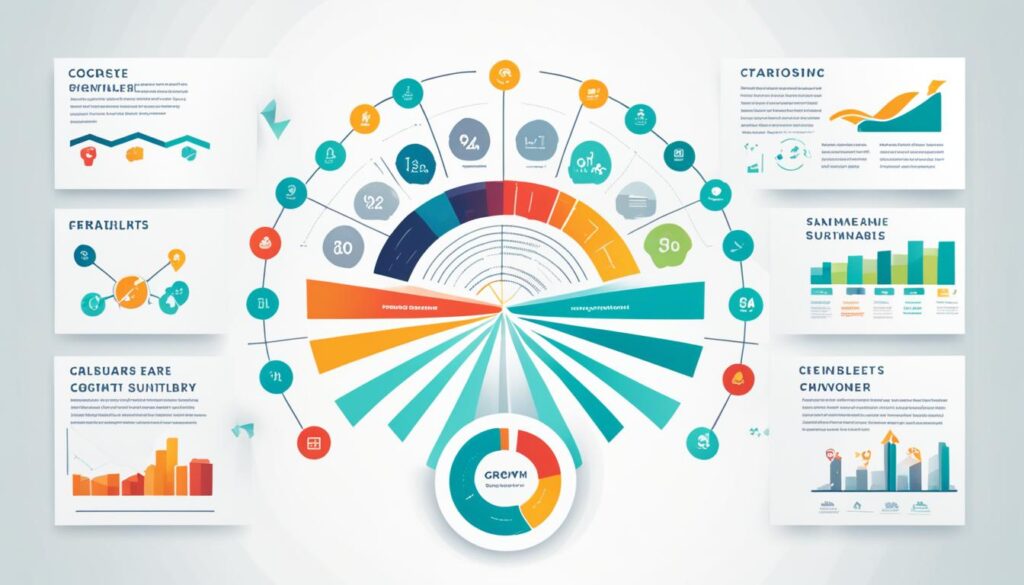In the ever-changing world of business, companies need to adapt and grow to stay successful. To navigate this journey towards success, it is essential to understand the importance of strategic evolution and embrace non-scalable growth tactics. By following proven strategies and implementing them effectively, businesses can unlock their full potential and thrive in today’s competitive landscape.
In this article, we will explore “The Five Laws of Growth” – a comprehensive framework designed to help businesses achieve sustainable success. These laws encompass strategic planning, self-improvement, leveraging product-market fit, data-driven strategies, scalability, evolutionary growth approaches, embracing change, and understanding performance marketing – all key elements for strategic evolution and achieving non-scalable growth.
Key Takeaways:
- Strategic planning is crucial for aligning different parts of the organization and optimizing resource allocation.
- Self-improvement enhances personal growth, adaptability, and continuous learning, contributing to long-term success.
- Leveraging the power of product-market fit and customer feedback drives growth opportunities and increases customer loyalty.
- Data-driven strategies help businesses optimize marketing campaigns, streamline operations, and maximize profitability.
- Implementing scalable frameworks allows for efficient growth without compromising quality or performance.
By understanding and implementing these non-scalable growth tactics, businesses can evolve strategically, adapt to market changes, and achieve long-term success. So, let’s explore each of these strategies in-depth and unlock the secrets to sustainable growth.
Understanding the Importance of Strategic Planning in Business Growth
Strategic planning is a crucial aspect of driving business growth and achieving long-term success. By developing a well-defined strategic plan, companies can align their efforts, make informed decisions, and optimize resource allocation to propel their growth trajectory. Here’s why strategic planning should be at the core of your business strategy.
1. Aligning Different Departments
Effective strategic planning ensures that all departments within your organization are working towards a common set of goals and objectives. It promotes cross-functional collaboration, improves communication, and fosters a shared sense of purpose. When everyone is on the same page, it becomes easier to execute strategies and drive business growth.
2. Guiding Decision-Making
Strategic planning provides a framework for making informed decisions based on a thorough analysis of internal and external factors. It helps you identify opportunities, assess risks, and prioritize initiatives that align with your business goals. By having a clear roadmap, you can navigate uncertainties and make decisions that support your long-term growth objectives.
3. Optimizing Resource Allocation
Effective resource allocation is essential for sustainable business growth. Strategic planning enables you to allocate your resources wisely by identifying areas where they can have the most impact. It helps you prioritize investments, utilize your budget efficiently, and optimize the allocation of your human capital. By strategically allocating resources, you can maximize your chances of achieving your growth objectives.
“Strategic planning helps align different departments, guides decision-making, and optimizes resource allocation.”
https://www.youtube.com/watch?v=kh8ecS8jWVA
Strategic planning is a key driver of business growth, as it sets the foundation for accomplishing your goals and objectives. It ensures that your organization is moving in the right direction, adapting to market changes, and making proactive decisions to foster growth. Without a strategic plan in place, businesses can struggle to achieve their desired outcomes and capitalize on growth opportunities.
- Set clear business goals and objectives
- Identify key strategies to achieve those goals
- Define actionable steps and timelines for implementation
- Regularly review and adjust your strategic plan based on performance
By consistently reviewing and refining your strategic plan, you can adapt to market dynamics, stay ahead of your competition, and keep your business on a growth trajectory. Strategic planning is an ongoing process that requires continuous evaluation and adjustment to ensure its effectiveness. When done right, it can be a powerful tool for driving business growth and achieving long-term success.
The Role of Self-Improvement in Unlocking Success
In today’s fast-paced world, self-improvement plays a vital role in unlocking success. By investing time and effort into personal growth, adaptability, and continuous learning, you can pave the way for a fulfilling and prosperous life, both personally and professionally.
Setting meaningful goals is the first step towards self-improvement. Clearly defining what you want to achieve allows you to focus your energy and resources on the areas that matter most to you. Whether it’s acquiring new skills, enhancing existing ones, or developing a growth mindset, goals provide the necessary direction and motivation to propel you forward on your journey to success.

Adaptability is another crucial aspect of self-improvement. In an ever-changing world, those who can quickly adapt to new circumstances and challenges are more likely to thrive. By embracing change and proactively seeking opportunities for growth, you can stay ahead of the curve and seize favorable circumstances as they arise.
Continuous learning is the fuel that drives self-improvement. It expands your knowledge, broadens your perspectives, and keeps you intellectually agile. Embrace a mindset of curiosity, actively seek out new information, and remain open to different ideas and perspectives. This commitment to lifelong learning will not only sharpen your skills but also enhance your problem-solving abilities and boost your overall personal and professional growth.
“The only person you should try to be better than is the person you were yesterday.” – Matty Mullins
Self-improvement is a journey, and it requires discipline, perseverance, and a willingness to step outside your comfort zone. Embrace the challenges that come your way, as they are opportunities for growth and self-discovery. With each small step you take, you move closer to unlocking your full potential and realizing your dreams.
So, invest in yourself, set ambitious goals, embrace change, and commit to continuous learning. Through self-improvement, you can unleash the power within you and unlock the success you’ve always envisioned.
Leveraging the Power of Product-Market Fit for Growth
In order to drive growth and achieve success, businesses must focus on leveraging the power of product-market fit. Product-market fit refers to how well a product or service satisfies the needs and demands of a specific market segment. When a strong product-market fit is achieved, businesses can better understand their customers, refine their offerings, and drive growth opportunities.
One of the key elements for achieving product-market fit is customer feedback. By actively seeking and listening to customer feedback, businesses can gain valuable insights into what is working well and where improvements can be made. This feedback loop allows companies to iterate on their products or services, making them more aligned with customer expectations.
“Customer feedback is crucial in the process of refining your product or service. It provides invaluable insights into what your customers truly want and need, allowing you to make informed decisions and drive meaningful improvements.”
Iterating based on customer feedback involves making continuous improvements to the product or service to better cater to customer needs and expectations. This iterative approach helps businesses stay competitive and adapt to ever-changing market dynamics.
By aligning their offerings with customer expectations through product-market fit and iteration, businesses can foster customer loyalty. When customers feel that a product or service perfectly meets their needs, they are more likely to remain loyal and continue to advocate for the brand.
So, how can businesses leverage the power of product-market fit for growth? It begins with understanding customer needs, actively seeking and listening to their feedback, and iterating on the offerings based on that feedback. By doing so, companies can unlock growth opportunities, increase customer loyalty, and position themselves for long-term success.

Data-driven Strategies: Unveiling the Secrets to Sustainable Growth
Data-driven strategies are essential for businesses to gain valuable insights into their customers, market trends, and competition. By analyzing and interpreting data, you can make informed decisions and optimize various aspects of your business for sustainable growth. Let’s explore how data-driven strategies can unlock the secrets to your success.
Gaining Customer Insights
One of the key benefits of data-driven strategies is the ability to gain deep customer insights. By analyzing customer data, such as purchase behavior, demographics, and preferences, you can understand their needs and tailor your products or services to meet them. This valuable information allows you to develop personalized marketing campaigns, deliver relevant content, and enhance customer experiences, ultimately leading to increased customer satisfaction and loyalty.
Optimizing Marketing Campaigns
Data-driven strategies enable you to optimize your marketing campaigns by identifying the most effective channels, messages, and timing. By analyzing marketing performance metrics such as click-through rates, conversion rates, and customer acquisition costs, you can identify areas for improvement and make data-backed decisions to optimize your marketing efforts. This targeted approach not only maximizes your marketing budget but also drives higher engagement and conversion rates.
Streamlining Operations
Another advantage of data-driven strategies is their ability to streamline operations. By analyzing operational data, such as production efficiency, supply chain performance, and inventory management, you can identify bottlenecks and inefficiencies. With these insights, you can make data-driven optimizations to streamline workflows, reduce costs, and improve overall operational efficiency, leading to increased productivity and profitability.
“Data-driven strategies empower businesses to adapt and evolve strategically in a competitive landscape.”
Maximizing Profitability
By leveraging data-driven strategies, you can make informed decisions that maximize profitability. Through data analysis, you can identify areas where cost savings can be realized, such as optimizing pricing strategies, managing inventory levels, and reducing wastage. Furthermore, by understanding customer behaviors and preferences through data insights, you can identify opportunities for upselling and cross-selling, driving additional revenue streams and improving your bottom line.
As illustrated above, data-driven strategies are the key to unlocking sustainable growth. By gaining valuable customer insights, optimizing marketing campaigns, streamlining operations, and maximizing profitability, you can position your business for long-term success in a competitive landscape. Embrace data-driven strategies and watch your business thrive.

Scaling with Frameworks: A Key to Long-term Success
When it comes to scaling your business for long-term success, implementing scalable frameworks is essential. Scaling isn’t just about adding more resources; it’s about strategically evolving your operations using frameworks designed for growth. These frameworks provide a structured approach that streamlines processes, ensures consistency, and provides the flexibility needed for business expansion.
By adopting scalable frameworks, you can handle growth efficiently without compromising quality or performance. These frameworks provide a roadmap for scaling your business, outlining the necessary steps and processes to support your growth trajectory. They enable you to scale your operations while maintaining a strong foundation.
One of the key benefits of using frameworks for scaling is the ability to streamline and optimize processes. With a framework in place, you can identify areas that can be automated or improved to increase efficiency. By streamlining your operations, you can eliminate bottlenecks and reduce inefficiencies, ultimately enhancing productivity and driving growth.
“Implementing scalable frameworks allows businesses to handle growth efficiently without compromising quality or performance.”
Consistency is vital for long-term success. By utilizing frameworks, you can establish and maintain consistent processes across different teams and departments. This consistency ensures that everyone is aligned and working towards the same goals, fostering collaboration and minimizing confusion. Consistency also improves the customer experience, as they receive the same level of quality and service every time they interact with your company.
Flexibility is another crucial aspect of scaling with frameworks. As your business grows, you may encounter new challenges and opportunities. Frameworks provide the flexibility to adapt to these changes while maintaining a structured approach. They allow you to pivot and explore new avenues without disrupting the overall operations of your business.
Implementing scalable frameworks is an investment in the future of your business. It enables you to lay a strong foundation for growth and adaptability, setting you up for long-term success. By strategically evolving your operations and leveraging frameworks designed for growth, you can scale your business with confidence and ensure its sustained success.

The Benefits of Scaling with Frameworks:
- Efficient handling of growth
- Streamlined and optimized processes
- Consistency across teams and departments
- Flexibility to adapt to changes and explore new opportunities
Building Loops, not Funnels: The Evolutionary Approach to Growth
When it comes to achieving sustainable growth, building feedback loops and embracing experimentation are crucial strategies. By establishing feedback loops, you create a continuous flow of information from your customers, allowing you to adapt your strategies based on real-time data. This iterative process enables you to make informed decisions and optimize your approach for maximum impact.
Customer feedback forms the foundation of a successful feedback loop. By actively seeking input from your customers, you gain valuable insights into their needs, preferences, and pain points. This data serves as a compass, guiding you towards designing products and services that meet and exceed customer expectations.
Besides gathering feedback, experimentation plays a vital role in driving growth. By trying out new ideas and approaches, you can explore uncharted territories and discover innovative solutions. It opens the door to creativity and allows you to identify what works best for your business.
“Innovation distinguishes between a leader and a follower.” – Steve Jobs
Embracing an evolutionary approach to growth means continuously adapting and evolving based on customer feedback and experimentation. It prioritizes personalized experiences and exceptional customer service, nurturing long-lasting relationships that fuel organic growth.
Why Feedback Loops Are Critical
Feedback loops act as a feedback mechanism that helps you gather valuable insights and align your strategies with customer needs. Here’s why they are critical for your business:
- Real-time data: Feedback loops provide you with real-time data that allows you to make data-driven decisions and adapt quickly to changing market dynamics.
- Improved customer relationships: By actively seeking customer feedback, you demonstrate that you value their opinions and are committed to improving their experience. This fosters trust and loyalty, leading to stronger relationships and increased customer retention.
- Opportunities for innovation: Feedback loops expose you to new ideas and perspectives, giving you the opportunity to innovate and differentiate your products or services in the market.
The Power of Experimentation
Experimentation is the driving force behind growth and innovation. Here’s why it’s essential:
- Allows for creativity: Experimentation encourages you to think outside the box, explore new avenues, and challenge the status quo. It empowers you to push boundaries and unlock new possibilities.
- Identifies what works: By experimenting with different approaches, you gain valuable insights into what resonates with your target audience and drives results. This knowledge helps you optimize your strategies and achieve sustainable growth.
- Encourages agility: Experimentation promotes a culture of agility, adaptability, and continuous learning. It allows you to respond quickly to market changes and stay ahead of the competition.
By building feedback loops and embracing experimentation, you create an environment that fosters growth, innovation, and customer-centricity. It’s an evolutionary approach that sets the foundation for long-term success.

Image: Feedback loops are instrumental in driving growth and nurturing customer relationships.
Growth is Evolution, not Revolution: Embracing Change for Success
In today’s fast-paced and competitive business landscape, embracing change is not just an option but a necessity for achieving success. To stay ahead and thrive, businesses must recognize that growth is an evolutionary process rather than a revolutionary one. It requires continuous adaptation, innovation, and a willingness to embrace change.
Evolution is a natural and ongoing process in any industry. Customer needs and preferences evolve, market dynamics change, and technological advancements create new opportunities and challenges. By recognizing and embracing this reality, businesses can position themselves as leaders and drivers of change in their respective industries.
Fostering a culture that embraces change and forward-thinking is essential. It requires a mindset that encourages constant improvement, experimentation, and a willingness to step out of the comfort zone. It means being adaptable and open to new ideas, technologies, and methodologies that can propel the business forward.
“The only constant in life is change.” – Heraclitus
The quote above from Heraclitus, an ancient Greek philosopher, perfectly encapsulates the essence of embracing change. To achieve growth and success, businesses must adopt a mindset that welcomes change as an opportunity rather than a threat. Change brings new perspectives, innovative solutions, and the potential for breakthroughs.
Adapting Strategies, Products, and Services
To effectively embrace change, businesses need to continually evaluate and adapt their strategies, products, and services. This requires a deep understanding of customer needs, market trends, and competitor activities. By staying attuned to these factors, businesses can make informed decisions and implement changes that align with evolving demands.
Evolutionary growth involves embracing new technologies, exploring emerging trends, and finding creative ways to leverage them for business advantage. It means seeking sustainable competitive advantages that set the business apart from competitors and enable long-term success.
Key Strategies for Embracing Change:
- Stay aware of industry trends and customer preferences through market research and analysis.
- Encourage a culture of continuous learning and improvement within the organization.
- Invest in innovation and research to identify new opportunities for growth.
- Regularly reassess and adapt business strategies to align with evolving market dynamics.
- Embrace technological advancements and explore their potential to drive business growth.
By embracing change and continuously evolving, businesses can remain competitive and seize new opportunities as they arise. Remember, growth is an evolutionary journey, and those who proactively adapt and embrace change are best positioned for long-term success.
Understanding Performance Marketing for Sustainable Growth
Performance marketing is an essential strategy for businesses looking to achieve sustainable growth. By focusing on measurable results and scalability, performance marketing enables companies to optimize their marketing efforts effectively.
Unlike traditional marketing methods that rely on broad audience targeting, performance marketing hones in on specific audiences. This targeted approach allows businesses to reach the right people at the right time, increasing the likelihood of desirable actions or outcomes.
One key advantage of performance marketing is its ability to track campaign success in real-time. By utilizing analytics and tracking tools, businesses can monitor the effectiveness of their marketing efforts, allowing for quick adjustments and optimizations. This data-driven approach ensures that resources are allocated to the most effective channels, maximizing return on investment.
Furthermore, performance marketing provides measurable results. With clear metrics and KPIs, businesses can assess the success of their campaigns and make data-backed decisions. This enables continuous improvement and refinement, leading to better outcomes and higher conversion rates over time.
Another significant benefit of performance marketing is its scalability. As businesses grow and expand, performance marketing strategies can be easily scaled to accommodate increased demand and reach. This flexibility allows for the efficient allocation of resources and ensures that marketing efforts align with ongoing business objectives.
Implementing performance marketing can be highly advantageous for businesses seeking sustainable growth. It offers a results-driven approach, ensuring that marketing efforts are focused on achieving measurable outcomes. With the ability to track and analyze campaign success in real-time, businesses can continuously optimize their strategies for maximum effectiveness. The scalability of performance marketing also allows for efficient resource allocation, enabling businesses to adapt and grow as demand increases.
Overall, understanding and leveraging performance marketing as part of a comprehensive growth strategy can significantly contribute to a business’s long-term success.
Conclusion
In conclusion, unlocking non-scalable growth tactics is crucial for businesses to achieve long-term success and remain competitive in today’s dynamic market landscape. By strategically planning their path forward, companies can navigate the challenges and seize opportunities that arise, ensuring a strong foundation for growth.
Self-improvement is a key component of unlocking success, as it fosters personal growth, adaptability, and continuous learning. By setting clear goals and working towards them, individuals can unlock their full potential and drive their organizations towards success.
Leveraging product-market fit and continuously iterating based on customer feedback allows businesses to stay aligned with the changing needs and expectations of their target market. By leveraging data-driven strategies, companies can gain valuable insights, optimize their operations, and make data-backed decisions to drive sustainable growth.
Furthermore, scalability and embracing change are essential aspects of strategic evolution. By implementing scalable frameworks and staying open to change, businesses can adapt their strategies, products, and services to meet evolving customer demands and maintain competitiveness.
Understanding the power of performance marketing and its measurable results enables businesses to optimize their marketing efforts and achieve scalable growth. By tracking campaign success in real-time and targeting specific audiences, companies can maximize the impact of their marketing efforts and drive sustainable growth.
Overall, by incorporating these non-scalable growth tactics into their business strategies, companies can position themselves for long-term success, strategic evolution, and continued growth in today’s ever-changing market environment.
FAQ
What are non-scaleable growth tactics?
Non-scaleable growth tactics refer to strategies and approaches that cannot be easily replicated or expanded as a business grows. These tactics are not scalable in the sense that they cannot handle increased demand or growth without significant adjustments or compromises.
How can non-scaleable growth tactics contribute to success?
Non-scaleable growth tactics can contribute to success by providing unique opportunities, competitive advantages, and differentiation in the market. While they may not be easily replicated, they can create a strong foundation for early growth and customer loyalty.
What is the importance of strategic evolution in business?
Strategic evolution in business is crucial for long-term success. It involves continuously adapting and evolving strategies, products, and services to meet changing customer needs and market trends. By embracing change and forward-thinking, businesses can stay competitive and relevant in a dynamic market landscape.
How does strategic planning affect business growth?
Strategic planning plays a vital role in business growth by aligning different departments, guiding decision-making, and optimizing resource allocation. It helps businesses set clear goals, outline actionable steps, and foster collaboration within the organization. Strategic planning ensures that businesses work towards long-term success with a well-defined roadmap.
Why is self-improvement important for achieving success?
Self-improvement is important for achieving success as it enhances personal growth, adaptability, and continuous learning. By setting goals and working towards them, individuals can unlock their potential and achieve greater heights professionally and personally. Self-improvement fosters resilience, creativity, and a mindset of constant growth.
How does product-market fit contribute to growth?
Product-market fit is the alignment between a product or service and its target market. By identifying and continuously iterating based on customer feedback, businesses can enhance their product-market fit. This, in turn, drives growth opportunities and increases customer loyalty by ensuring that the offerings meet the needs and expectations of the customers.
How can data-driven strategies drive sustainable growth?
Data-driven strategies help businesses gain insights into customers, market trends, and competition. By analyzing and interpreting data, companies can optimize their marketing campaigns, streamline operations, and maximize profitability. Leveraging data empowers organizations to adapt and evolve strategically in a competitive landscape, leading to sustainable growth.
What role do frameworks play in scaling a business?
Frameworks play a crucial role in scaling a business efficiently and effectively. Implementing scalable frameworks allows businesses to handle growth without compromising quality or performance. A scalable framework is designed to evolve operations strategically, streamline processes, ensure consistency, and provide flexibility for business expansion.
What is the significance of feedback loops and experimentation in growth?
Feedback loops and experimentation are essential for growth. By gathering and utilizing customer feedback, companies can adapt strategies based on real-time data and nurture customer relationships. This evolutionary approach focuses on personalized experiences and exceptional customer service to drive organic growth and continuous improvement.
Why is embracing change important for success?
Embracing change is necessary for staying competitive and achieving success. Businesses must continuously evolve their strategies, products, and services to meet changing customer needs. By fostering a culture that embraces change and forward-thinking, organizations can stay relevant, adapt to market dynamics, and seize new opportunities.
What is performance marketing and its role in sustainable growth?
Performance marketing is a results-driven approach that maximizes desirable actions or outcomes. It targets specific audiences, tracks campaign success in real-time, and provides a measurable and scalable approach for optimizing marketing efforts. Performance marketing enables businesses to identify effective strategies, allocate resources efficiently, and achieve sustainable growth.
